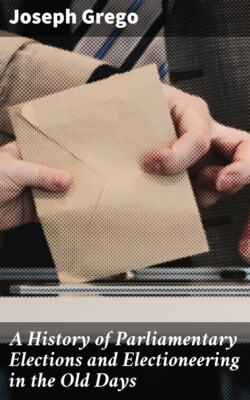Читать книгу A History of Parliamentary Elections and Electioneering in the Old Days - Joseph Grego - Страница 12
На сайте Литреса книга снята с продажи.
“Resolved, Nemine Contradicente—
ОглавлениеThat to traduce such Petitioning is a violation of duty, and to represent it to his Majesty as Traitorous and seditious, is to betray the Liberty of the Subjects, and contributes to the design of subverting the ancient, legal Constitution of this Kingdom, and the Introducing Arbitrary Power.
”Ordered—That a Committee be appointed to enquire of all those Persons as have offended against these Rights of the subject.
“London: Printed for Francis Smith, Bookseller, at the Elephant and Castle, near the Royal Exchange in Cornhill.”
Francis Smith was the publisher—
“who suffered a Chargeable Imprisonment in the Gaol of Newgate, in December last, for printing and promoting Petitions for the Sitting of this present Parliament.”
He is referred to with acrimony in the ballads by Tantivy and courtier bards, among the “pestiferous crew of republican scribes.”
Charles’s first parliament was, amid the confusion of the time (the revolution subverted and royalty restored), barely constituted; it lasted from April 25, 1660, to December 29th, and, being assembled without the king’s writ, was, with customary royal ingratitude for “past favours,” considered by Charles as the Convention Parliament.11 The long Cavalier Parliament, some portion of which, like the king, was in the pay of Louis XIV., is stigmatized to posterity as the “Pensionary” Parliament; it met May 8, 1661, and lasted until January 24, 1679; the members were doubly corrupt, accepting money-bribes or lucrative offices from the Court, or being, according to Barillon’s clear declarations, in the pay of France and Holland, as regarded the patriotic members, who fiercely denounced the venality of the Court. In 1675 the oath against bribery was opportunely inaugurated, providing against corruption either from the Crown or from any ambassador or foreign minister. The Pensionary Parliament, which began its career by servile loyalty, and was merciless against Republicans, towards its close opposing the unreasonable extension of prerogative became factious and insubordinate, arrogating to itself the control of legal procedure, and, according to the opinions of extreme Royalists, generally proving itself a “scourge.”
The popular view of this venal legislature is given in the following version:—
